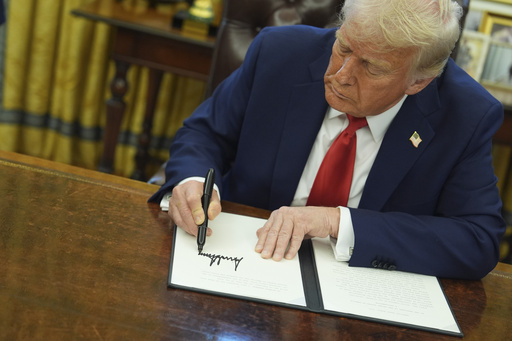
Seven families with transgender or nonbinary children took legal action on Tuesday against President Donald Trump’s executive orders, which aim to redefine sex narrowly and terminate federal assistance for gender-affirming healthcare for individuals under 19 years old.
PFLAG, an organization that supports LGBTQ+ families, along with GLMA, a professional group of healthcare providers, joined as plaintiffs in the lawsuit filed in a federal court in Baltimore.
This legal challenge follows Trump’s recent directive to cease federal funding for medical services provided through programs like Medicaid and TRICARE that cater to gender-affirming healthcare.
Kristen Chapman, one of the mothers involved in the lawsuit, shared that her family relocated from Tennessee to Richmond, Virginia, in 2023 due to a ban on gender-affirming care in Tennessee. Last week, her 17-year-old daughter, Willow, was scheduled for an appointment with a new healthcare provider who accepted Medicaid. However, the day before the appointment, Trump’s order was signed, and the hospital informed them that care could no longer be provided.
“I believed Virginia would be a safe haven for my daughter and me,” Kristen Chapman expressed. “I am now left feeling heartbroken, exhausted, and frightened.”
Brian Bond, the CEO of PFLAG, reinforced Chapman’s sentiments during a conference call, stating, “We are inundated with calls from parents whose children’s treatments have been canceled.”
Together with the ACLU and Lambda Legal, who are representing the families, they are requesting that a judge impose a temporary hold on the executive order. The court filings label Trump’s orders as “illegal and unconstitutional,” claiming they aim to retract authorized federal funds while breaching civil rights protections. Additionally, the challenge argues that the orders violate parental rights.
Similar to legal battles against state laws that prohibit gender-affirming care, the plaintiffs maintain that this policy discriminates by permitting federal funding for non-gender transition procedures. The White House has yet to comment on the lawsuit.
In the wake of the executive orders, several healthcare providers have paused their coverage as they analyze the implications of the new rules. New York Attorney General Letitia James, who has a history of entering legal disputes with the Trump administration, cautioned hospitals in her state that halting gender-affirming care for minors would be against the law.
Josh Block, an ACLU attorney involved in the case, emphasized that medical professionals should continue to provide gender-affirming care for individuals under 19. “No protest, letter from the Attorney General, or temporary restraining order should be necessary for them to do what is ethically right,” he asserted.
Trump’s policies surrounding transgender issues mark a significant shift from the previous Biden administration, which had been focused on broadening civil rights protections for transgender individuals.
In his order regarding gender-affirming care, Trump criticized medical professionals, claiming they were “maiming and sterilizing” vulnerable children based on what he termed a “radical” and “false” assertion that sex can be altered in minors.
Alex Sheldon, the executive director of GLMA, highlighted that there are established medical guidelines in place for treating transgender youths. “An extreme political agenda is now attempting to override this medical expertise, endangering both young individuals and their providers,” he stated, expressing confidence that legal, scientific, and historical perspectives support their stance.
In addition to issues surrounding healthcare access and a rigid definition of sex, Trump signed other orders that may lead to the exclusion of transgender individuals from military service and altered educational regulations about gender.
There have already been legal objections raised against the military order and proposals to transfer transgender women in federal prisons to male facilities, with more challenges anticipated, reflecting the ongoing resistance to various Trump policies.
Research indicates that less than 1 in 1,000 adolescents receive gender-affirming care, which may include puberty blockers, hormone treatments, and surgeries—although surgeries for minors are exceedingly rare.
While transgender individuals have found greater visibility and acceptance, opposition has intensified, with at least 26 states enacting laws that restrict or prohibit care for minors. The U.S. Supreme Court has heard arguments on Tennessee’s ban on such care but has yet to deliver a decision on its constitutionality.

